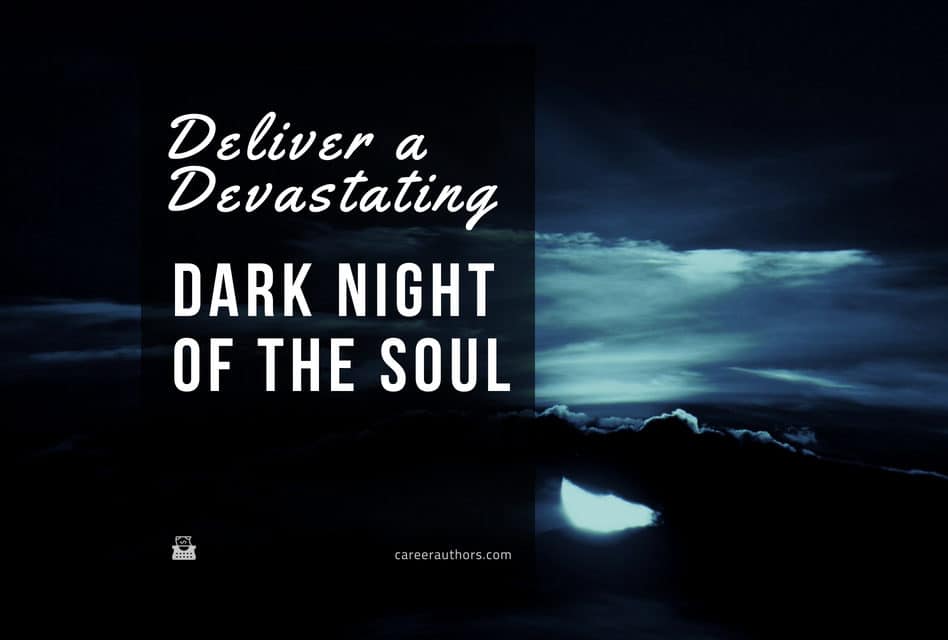If you hang around writers long enough, you might hear the phrase “dark night of the soul.” What, exactly, does it mean, and why should you care?
The dark night of the soul is a moment, usually at the end of the second act of your novel if you’re writing in a three-act structure, where all seems lost and your protagonist must confront what Eckhart Tolle calls “a collapse of perceived meaning.”
Blake Snyder, in his classic screenwriting book, Save the Cat, describes it as the moment where the hero is beaten and knows it.
Why is this moment—it can last a couple of paragraphs or several pages—important?
For several reasons.
First, it’s relatable. We’ve all been there—crushed, hopeless, unable or unwilling to see beyond the darkness enveloping us. Our moment might have been the result of a friend’s betrayal, where our heroine’s moment might stem from knowing she failed to stop the bad guys from releasing the bio-weapon that’s going to wipe out half the planet’s population, but it’s the same moment.
Second, it gets to the essence of our protagonist. It strips him of any sense that he’s in control; it humbles him. Only after he’s confronted his humanity and pondered the meaning of what’s happening and why he’s engaged in the quest at hand (whether that be wooing a lover, building a relationship with an estranged son, or saving the world from aliens), can he move on and find a solution.
At its heart, the dark night of the soul (DNOS) is your character grappling with a death of some kind—a mentor, her profession, a relationship, his reputation, her sense of who she is, etc.
Does my book need a DNOS?
But I write cozy mysteries, you say, or humorous YA, or frothy romances. My characters don’t have moments like that! It would totally wreck the tone of the book. Characters in all genres can—and should, I contend—experience dark nights of the soul. It’s a matter of intensity, a matter of how dark, if you like. In lighter genres, the dark nights might be more of a medium gray than an inky black. Are there plenty of books out there without this moment? Yup. Do they offer as satisfying a reading experience?
Nope. Uh-uh. Not even close.
The fact remains that your protagonist has to hit bottom and know it—whether that’s recognizing that it’s his fault the basketball team lost the state championship in a YA novel, comprehending that her methods make her no better than the killers she hunts in a noir detective novel, or realizing that his devotion to work has destroyed a relationship in a romance novel. Note the use of words like “comprehend,” “realize,” “recognize.” This is the moment when our characters stare into their souls (prompted by the story’s events), and confront the ugliest truth.
In books with hope, this will be the darkness before the dawn, and the character will then be able to move in a more positive direction, frequently with the help of another character. In a tragedy, the dark night of the soul sets the individual on the path to her ultimate destruction, ruin, despair.
Creating the DNOS
All of this is to say that you, as a writer, should be aware of this moment and hone and position it for strongest effect. If it’s already in your WIP, how can you make it darker, more powerful, bleaker? How can you relate it to your book’s theme? If your novel doesn’t have a dark night of the soul, where can you put one? How can you arrange events to push your protagonist to this moment?
Come over to our Facebook page and let us know what you think of dark nights of the soul. What sorts of things does your heroine grapple with in her dark night? Is it hard to heap so much misery on your hero? Let us know! (Maybe we can help.)





